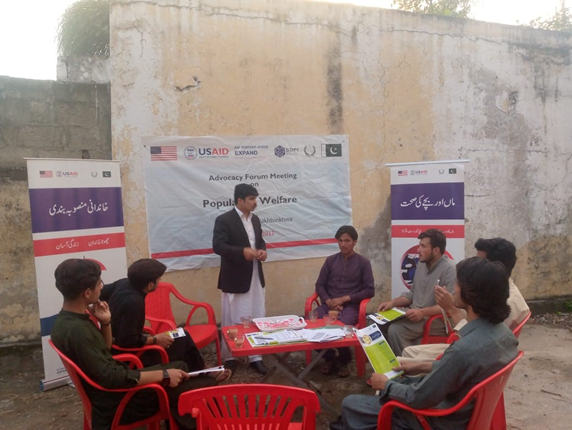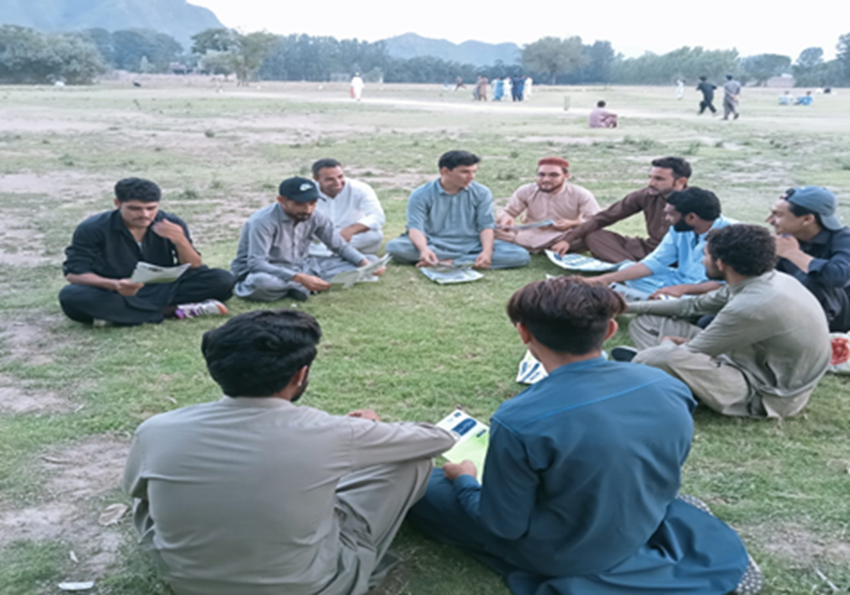Success Story
Challenging Taboos – Youth Engagement Drives Family Planning Awareness in District Buner
March 29, 2024
Discussing family planning (FP) and reproductive health (RH) in conservative and remote areas like Tehsil Daggar and Gagra of district Buner, in the northern part of Khyber Pakhtunkhwa, Pakistan, remains a huge challenge stemming from cultural and religious norms of these communities. The reluctance to engage in these discussions is deeply embedded in the community’s cultural and religious beliefs, where topics related to FP and RH are often viewed through a lens of skepticism and taboo. This has implications not only for the immediate health and well-being of individuals but also for the long-term development and prosperity of the community. Addressing these challenges requires a subtle understanding of the local context, including the religious teachings and cultural traditions that shape attitudes toward health and family planning.
Increased access to and utilization of basic health services including FP services is one of the key objectives of the USAID New Partnerships Initiative (NPI) EXPAND Human Development Activity (HDA). Collaborating with Sustainable Development Policy Institute (SDPI), a partner organization, NPI EXPAND HDA focused its efforts in Buner to increase access to high-quality FP services. This initiative also aimed to raise community awareness regarding their entitlements and rights, fostering citizen-led advocacy and mobilization.
Recognizing the significant impact youth can have in driving community change, SDPI selected 42 Youth Ambassadors (YAs), half men and half women, from 21 villages targeted by the initiative. These YAs underwent extensive training encompassing three broad areas: community management skills, essential insights into family planning, and crucial information on maternal, newborn, and child health (MNCH), arming the YAs with the knowledge and tools needed to effectively communicate and advocate for FP at the grassroots level.

Advocacy Forum Meeting on population welfare.
Following their comprehensive training, each Youth Ambassador (YA) took the initiative to form Community Groups within their villages, setting up monthly gatherings aimed at orienting the community about the significance of rights-based family planning, the options available to them, obstacles to accessing quality FP services, and devising strategies to overcome these hurdles. In total, the YAs successfully facilitated 339 meetings across the community groups (168 for males and 171 for females), engaging a total of 4,183 participants (1,986 men and 2,197 women) in meaningful conversations about the critical role of FP.
The YAs rapidly encountered a notable cultural barrier in their outreach efforts: a pervasive reluctance among community members, regardless of gender, to openly discuss family planning in any setting, be it in one-on-one conversations or larger community gatherings. A Youth Ambassador from district Buner recalled,
“As workers on the ground, it is a major challenge to navigate FP and RH activities within these prevailing sensitivities of religious and cultural practices, aiming to gradually shift perceptions through education and empathetic engagement. Our mission is not just to inform but to lead the change process within the bounds of our culture and community values.”
He further added,
“In the start, skepticism and hesitancy remained high when we used to invite community members for FP awareness sessions. Usually, a significant number of participants used to leave soon after as I began with FP conversation, suspecting that I was pushing a specific agenda. Building on the learnings, we adapted a modified approach and started to begin the discussion on the health benefits of child spacing and linking it up with the children rights of breastfeeding for two years with a reference to the Holy Quran. This helped us to navigate the change within the community and gradually it allowed us to hold such discussion with boys and men in our community.”
As part of the community, YAs also leveraged their local connections and deep understanding of cultural and religious contexts to approach awareness-raising in a sensitive manner. Shabana, a trained female YA from Karappa village in district Buner, is a schoolteacher with a degree in Islamic Studies. She not only raised awareness among her fellow teachers at school about FP but also used her knowledge of religion to effectively engage community members on this topic.
She shared,
“I discuss the significance and rationale behind family planning from an Islamic perspective and its advantages. It’s an opportunity to demonstrate how scientific evidence aligns with Islamic teachings on the importance of FP. Islam emphasizes breastfeeding until a child is two years old, which introduces the Lactation Amenorrhea Method as a natural contraceptive method—a concept unfamiliar to many couples. I’ve encouraged many individuals from my sessions to visit local health centers to explore these options further.”
In another engaging reflection, Shahid, a male Youth Ambassador, shared,
“One of the most transformative aspects of our initiative has been empowering young couples with knowledge. Initially, there was a significant gap in understanding, particularly around modern contraceptive methods. Through dedicated sessions and open dialogue, we’ve seen a shift towards more informed decision-making. It’s been incredibly rewarding to witness community members, previously overwhelmed by myths and misconceptions, now confidently discussing, and planning their futures, fully aware of their options.”

Youth Ambassadors conduct a male awareness session at the community level on family planning in District Buner
The dedication of community group representatives drove them to form 20 Advocacy Forums at the Union Council level, ten for males and ten for females. These forums were established with the explicit aim of addressing the various challenges and issues inherent in delivering FP services. Their activities included identifying potential platforms for change and advocating for this cause with key stakeholders such as the media, district administration, and representatives from the Department of Health and the Population Welfare Department. Their primary achievement was to put forth a charter of demands, underscore their concerns, and advocate for substantive improvements in FP service delivery.
Sher Khan, member of one of the Advocacy Forums, shared,
“I’ve witnessed firsthand how our collective dedication has inspired real change. We were brought together to directly confront and solve the complex issues plaguing family planning services in our community. Through our concerted efforts, including dialogues with government officials, we’ve identified possibilities for reform. Our greatest achievement? Crafting a charter of demands that not only highlights our concerns but has also set the stage for significant improvements in family planning services.” In a significant move towards sustainability, SDPI assisted members of the Advocacy Forum in registering as community-based organizations, ensuring the sustainability and ongoing impact of their efforts beyond the project.
Youth engagement through Youth Ambassadors has proven to be remarkably effective in these communities, largely because the community members can easily relate to individuals who share their language, cultural and religious background. These ambassadors, fueled by their motivation and armed with accurate information, are driving a lasting transformation in how the community perceives and accesses family planning services. They’re not just spreading awareness; they’re breaking down age-old taboos surrounding FP, using their insights and energy to foster a more open, informed dialogue about reproductive health.
This grassroots approach, leveraging the distinctive position and perspective of the youth, underscores the power of peer-led initiatives in challenging longstanding community norms and paving the way for healthier, more empowered communities. Through these diverse and youth-appropriate engagement strategies, Youth Ambassadors are not only informing their communities but also inspiring a new generation to take charge of their reproductive health with confidence and support.